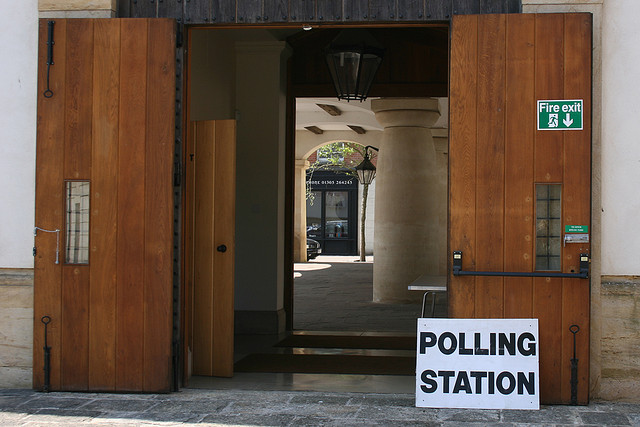The UK’s electoral infrastructure is functional due to the efforts of many individuals, but it cannot be taken for granted
Alistair Clark and Toby S. James argue that many people overlook the exhaustive efforts that poll workers put into elections. A new study on their experiences suggest that the 2015 general election was well-run, but some citizens were turned away from the polling station presumably because they were not registered to vote.

Credit: Marilyn Peddle, CC BY 2.0
Writing in 2013, David Cowling, the BBC’s Political Research Unit editor, closed his article by saying that elections are ‘a massive, extraordinary and complex operation: the biggest manifestation of civic society that any of us are ever likely to see‘. Consider the numbers involved. In the 2010 general election, nearly 24 million votes were cast in around 40,000 polling stations, with 5.8 million postal votes also being cast. Alongside this a further 13.6 million votes were cast in local elections in various parts of England. In 2015, the electorate was 46.4 million, with a turnout of 66.2% equating to more than 30.5 million votes being cast. In addition, there was a bumper round of local elections being held concurrently. To handle this, Cowling estimated that in 2015 there would be around 43,000 polling stations staffed by around 120,000 pollworkers, with another 80,000 involved in counting ballot papers.
The complex administration involved in running elections is largely taken for granted. Yet, without this organisation functioning well, much of the rest of what psephologists discuss and assume could not happen. Recent difficulties, such as the election night queues in 2010, concerns about electoral fraud in Tower Hamlets and assorted other difficulties around the country show that electoral administration cannot be taken for granted. Instead, it is ripe for research, not least in order to help improve matters and ensure that registered voters are able to turnout and cast their vote with the confidence that their vote will be counted accurately. Our own work has begun to address these issues.
In the 2015 general election, with funding from the British Academy and Leverhulme Trust, we conducted an extensive survey of polling station workers in eight English local authorities, covering 21 parliamentary constituencies in Norfolk and the North East. 3350 questionnaires were distributed with a response rate of approximately 39 per cent. To our knowledge, this is the first such study conducted outside of the US context, where poll worker surveys have been more common in the aftermath of the Bush-Gore controversy in 2000 and subsequent controversies around electoral administration. We sought to address a range of questions. In our early analyses we focus on three main issues:
- Who are the poll workers? What are their demographic characteristics?
- What training do they undergo? Do they find that training satisfactory?
- What problems do poll workers face implementing elections? How widespread are such problems?
We find a gender gap amongst polling station workers. Indeed, 63 per cent of respondents were women, and this finding held good at different levels of responsibility. On average, poll workers were 53 years of age, and just over half had taken time off from their normal job to work on polling day.
One criticism of election administration is that many poll workers are inexperienced, employed only for the short term of the election. The argument, generally forwarded from a US perspective, is that this may cause problems on polling day as staff may not be familiar with procedures. Our evidence begins to contradict this assertion. While just under a third (32.1 per cent) had worked at four elections or less, the average number of elections which poll workers had worked at was 9.6. Remarkably, a small number of respondents claimed to have worked at more than 30 elections, presumably including local elections, by-elections and so on. On average, as might be expected from the responsibility of the position, Presiding Officers had worked at around 15 previous elections. Polling clerks had less experience, having only worked at between 5-6 elections on average.
Most poll workers were trained in a session run by their local electoral services department, sometimes also with sessions talking through potential problems on the day. On the whole, there is satisfaction with the level of training given; 82 per cent rated their training session by local electoral services officials as either good or excellent.
Fortunately, 2015 did not see the same level of high profile difficulties as occurred in 2010 with the queues at the close of poll. To the extent that there were problems around the UK, these are likely to have been quite localised. Despite there being concern about electoral fraud and a subsequent current government enquiry into the issue, our evidence suggests that this problem is considerably overstated in polling stations; less than 1 per cent reported any concerns, while only around 5 per cent suggested any doubts about voters’ identity.
Our initial analyses points to a couple of different issues policymakers may wish to consider. Firstly, the most common difficulty on polling day was people asking to vote but who were not on the electoral register. This may be for a variety of reasons – because people have turned up at the wrong polling station, they have moved and forgotten to change their address and so on. These are people willing to participate in elections. Rather than turn them away, the government ought to examine ways of permitting them to vote. These might include an on the day registration process, or to permit voting in polling stations other than the one allocated.
Secondly, running multiple elections on one day using the same infrastructure adds pressure on polling station workers, and also to the likelihood of difficulties in electoral administration. It is testament to the professionalism of those working in polling stations that these seldom become major difficulties. However, this quotation from a poll worker clearly working where the general election and local election were combined gives a flavour of the pressure involved:
‘The polling station needed extra staff and booths. There were constant queues as people had to wait to vote. The poll clerks were constantly explaining procedure as there were so many different papers holding up the system. We also needed someone to assist with posting the votes in box and explaining the hold up to outside queues.’
More research is required on electoral integrity and administration in advanced democracies like the UK. Recent difficulties have suggested that the system works due to the efforts of many individuals but cannot be taken for granted. With international democracy day having been held last week, it is worth remembering just how valuable electoral democracy is, and how it is under pressure. Knowledge of those manning polling stations begins to answer that call.
—
Note: this post represents the views of the authors, and not those of Democratic Audit UK or the LSE. Please read our comments policy before posting.
—
 Dr. Alistair Clark is Senior Lecturer in Politics at Newcastle University. His research examines electoral integrity and administration, political parties and party systems. He is the author of Political Parties in the UK (Palgrave 2012), and a member of the UK Political Association Executive.
Dr. Alistair Clark is Senior Lecturer in Politics at Newcastle University. His research examines electoral integrity and administration, political parties and party systems. He is the author of Political Parties in the UK (Palgrave 2012), and a member of the UK Political Association Executive.
 Dr. Toby S. James is Senior Lecturer in Politics at University of East Anglia. He has published widely on electoral administration and management, including his book Elite Statecraft and Election Administration (Palgrave, 2012). He is a member of the advisory board of the Law Commission’s Review of Electoral Law.
Dr. Toby S. James is Senior Lecturer in Politics at University of East Anglia. He has published widely on electoral administration and management, including his book Elite Statecraft and Election Administration (Palgrave, 2012). He is a member of the advisory board of the Law Commission’s Review of Electoral Law.





 Democratic Audit's core funding is provided by the Joseph Rowntree Charitable Trust. Additional funding is provided by the London School of Economics.
Democratic Audit's core funding is provided by the Joseph Rowntree Charitable Trust. Additional funding is provided by the London School of Economics.
Our infrastructure is functional due to the efforts of many individuals, but it cannot be taken for granted https://t.co/LU4UCDoDva
UK electoral infrastructure is functional due to the efforts of many individuals, but it cannot be taken for granted https://t.co/79qlPWnwcF
Our electoral infrastructure is functional due to the efforts of many individuals, but it cannot be taken for granted https://t.co/HEaY43MPWF
New research on poll workers in UK GE2015 1st presented at @electintegrity workshop in SF-summary at Democratic Audit https://t.co/79qlPWnwcF
Our electoral infrastructure is functional due to the efforts of many individuals, but cannot be taken for granted https://t.co/6rerm8Knnz
UK’s electoral infrastructure is just functional thanks to the efforts of many staff, but can’t be taken for granted https://t.co/NUTEvnRsZr
UK’s electoral infrastructure functional due to the efforts of many individuals, but it cannot be taken for granted https://t.co/3hKXAYvchD
The UK’s electoral infrastructure is functional due to the efforts of many individuals, but it cannot be taken for… https://t.co/WHkPjKlF9D
… my husband, the genius… @ClarkAlistairJ you rock! and @TobySJames too, of course! 🙂 https://t.co/pjQkW4xZGx
Research on poll workers & election infrastructure by @ClarkAlistairJ & @TobySJames reported on @democraticaudit https://t.co/1hQkFLgR7Z
New @NclPolitics research on poll workers & election infrastructure reported on @democraticaudit by @ClarkAlistairJ https://t.co/RLfZZnYftN
UK electoral infrastructure is functional due to the efforts of many individuals,but cannot be taken for granted https://t.co/RLfZZnYftN
The UK’s electoral infrastructure is functional due to efforts of many individuals,but cannot be taken for granted https://t.co/79qlPWnwcF
The UK’s electoral infrastructure is functional due to the efforts of many individuals, but it cannot be taken… https://t.co/90Bjoe69bB
Our new study on poll workers reveals how the 2015 UK general election was well run, but some voters were turned away https://t.co/T1oMzTDJG7
The UK’s polling system works due to the efforts of many individuals, but it cannot be taken… https://t.co/3YmNMsrX5d https://t.co/X9rYVsRdRH